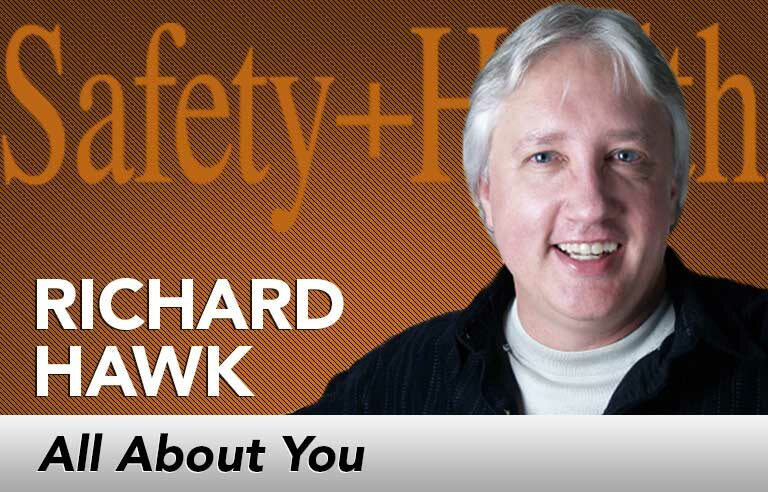All About You: Give a helping hand

EDITOR’S NOTE: Motivating employees to work safely is part of the safety professional’s job. But who motivates the motivator? In this monthly column, veteran safety pro and professional speaker Richard Hawk offers his entertaining brand of wisdom to inspire safety pros to perform at their best.
It feels good to help people. Our brains are hardwired to enjoy contributing to the success of others.
A major reason is that we need to serve each other to survive. Every day of our lives, we rely on other people. Buying food, getting to work and even sleeping in our beds is possible only because of services other people have provided.
Research has demonstrated that feel-good chemicals such as oxytocin and endorphins are released into our bloodstream while we’re caring for others.
Although our work as safety and health professionals helps others, sometimes we get tied up in the technical aspects of the job and concentrate too much on the “numbers.” Mother Teresa offered wise advice about that. She said, “Never worry about numbers. Help one person at a time, and always start with the person nearest you.”
Working with a spirit of service rather than just to make money and provide for yourself and your family can have a profound influence on your attitude and feelings. Over the course of my career as a professional speaker and consultant, I’ve come to realize that helping my audience is more fulfilling than making them laugh or being an entertainer. Sure, I still work on my “platform skills,” just as you may need to keep up on the technical aspects of your job, but that doesn’t mean you should neglect what matters most: making a positive difference in people’s lives.
‘How can I help you?’
During my seminars, I ask attendees to write on a blank index card a challenge they want me to help them overcome. Although it means I’ll have to change parts of my program, it gives me insight into how I can be of service and make the session more pertinent to my audiences. You can do the same.
Make a regular habit of asking employees how you can help them. Often, they won’t have an answer for you, but they will appreciate your wanting to be of service. When you get a request, do your best to fulfill it. Not only will it help your reputation, it will give you the feeling of satisfaction that comes from helping someone.
Years ago, when I was working on a construction site as a safety supervisor, one of the other safety professionals who had much more experience than I did set an example that has stayed with me. We called him “Safety Al,” and he constantly went out of his way to help the people working on the job – and not just on safety-related issues. I remember him bringing in a toy for one of the workers to give to his little girl, who was ill. He was always asking the crews how he could help them, and I never once saw him act as if it was a burden to go out of his way to be of service.
Helping is good for you
Helping out in your community is another way to make a difference in the world and to give back. You may already belong to a charitable organization or other group that aids people in need. If you do, you know it feels good to realize your efforts are improving people’s lives.
We benefit in many ways when we help others. In fact, it may help us live longer. Several studies have shown that regular acts of kindness and volunteering can improve your health. In a 2013 review of the health effects of volunteering, Dr. Suzanne Richards of the University of Exeter Medical School in Exeter, England, wrote that, “Our systematic review shows that volunteering is associated with improvements in health.”
Last year, I joined a local charity. At first, I regretted the commitment a bit, but not anymore. I’ve made new friends, and I’ve realized that time is never wasted when helping others, even if it doesn’t benefit my career or improve my finances. Serving is its own reward. One of my favorite quotes about the topic of giving comes from Winston Churchill: “We make a living by what we get. We make a life by what we give.”
This article represents the views of the author and should not be construed as a National Safety Council endorsement.
Richard Hawk helps companies around the world create more vibrant safety cultures by showing them how to make safety fun. As a professional speaker, author and musician, he also inspires employees to focus better and enlightens safety leaders about ways to increase their influence. To learn more about Richard, visit makesafetyfun.com.
Direct to your inbox: Sign up to be notified in email about new "All About You" columns.
Listen on Soundcloud or Stitcher
Post a comment to this article
Safety+Health welcomes comments that promote respectful dialogue. Please stay on topic. Comments that contain personal attacks, profanity or abusive language – or those aggressively promoting products or services – will be removed. We reserve the right to determine which comments violate our comment policy. (Anonymous comments are welcome; merely skip the “name” field in the comment box. An email address is required but will not be included with your comment.)

